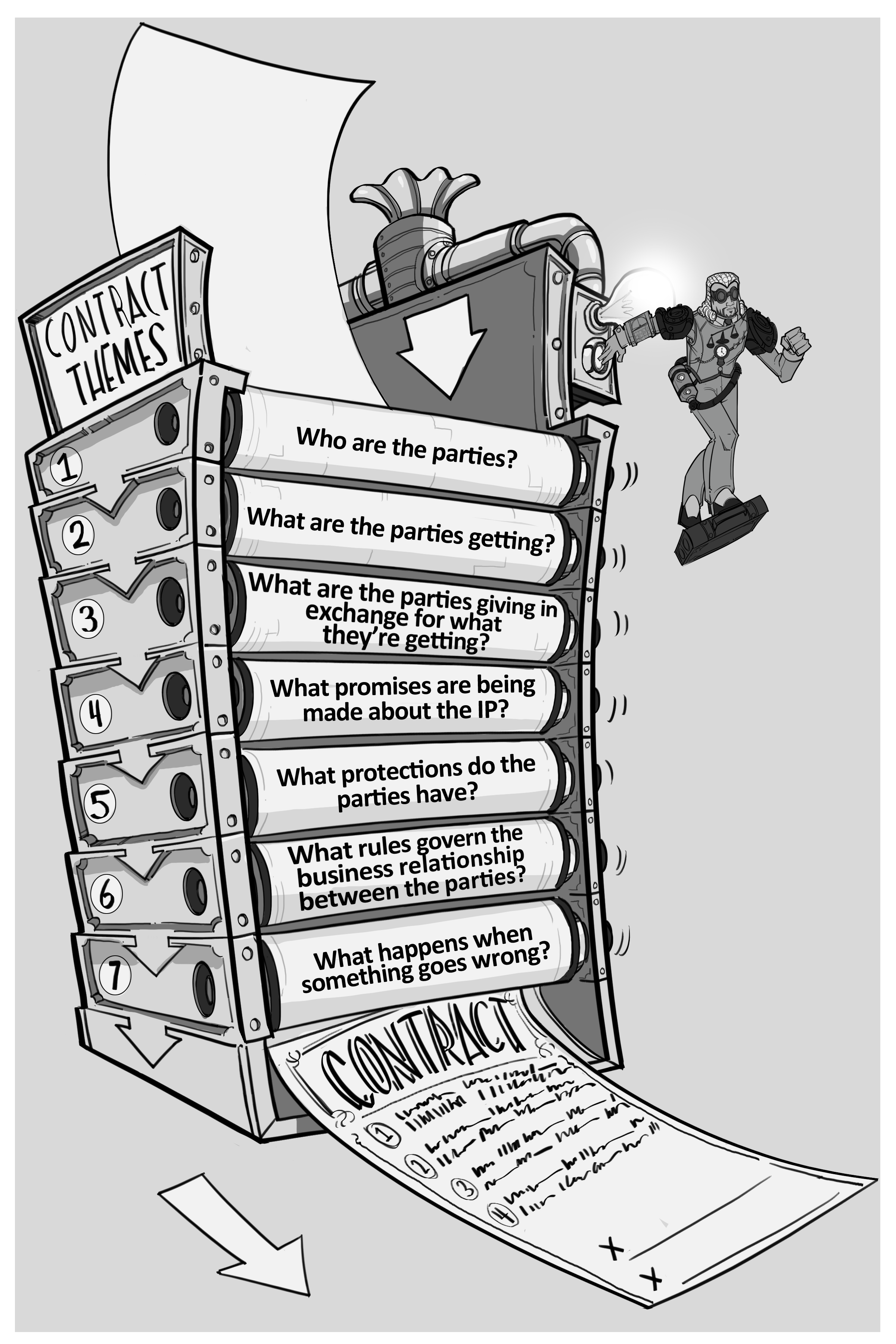Representing comic book creators can be exciting: you get to use your JD to protect costumed heroes and villains! Given Hollywood’s love of the comic book property, attorneys who practice IP law and work in the entertainment industries should have a working knowledge of the legal issues comic book creators face each time they begin a project.
Many comic book projects are collaborative, with one person writing the script (the writer), another creating the initial drawings (the penciller), a third inking the drawings (the inker), and a fourth and fifth adding color and lettering (colorist and letterer, respectively). What many creators don’t realize is that when two or more authors work together to create a comic book or graphic novel, copyright law may deem them to be joint authors, with ownership rights dictated by copyright law, in the absence of a written agreement.
As a result, collaboration is one of the issues fraught with IP peril — with the ownership of a hero’s copyright hanging in the balance!
Most artists enter into collaboration with the best intentions, with each collaborator wanting to put his or her best foot forward while viewing the relationship in only the most positive light. That’s why so many artists start working with just a handshake agreement between them (and perhaps a couple of emails vaguely outlining who will do what). However, things can fall apart pretty quickly and messily if one partner is not living up to the expectations of the other.
And if the relationship falls apart, without a written agreement it can be difficult to determine who owns the project. As you can imagine, it’s easier to decide ownership issues when both parties are enthusiastic and just starting out, rather than when the relationship has soured. In fact, any modification of exclusive copyright ownership requires a written, signed agreement. Think of a collaboration contract as both a road map and a prenuptial agreement.
Ownership of the property: How will the work be owned and by whom?
Here are just a few of the key copyright issues attorneys may want to consider when advising artist collaborations.
Joint authorship
Do the collaborators intend to be joint authors in the resulting work? If not, the agreement should explicitly state that.
If they do want to be considered joint authors, they might want to include language stating that in the event that a court deems one author’s contributions not to be copyrightable (often one of the criteria of joint authorship), the author with the copyrightable contribution assigns a copyright interest to his collaborator.
Rights Ownership
Is every right owned equally?
Is any portion of the work being created as a work for hire? If so, a written agreement is necessary with all independent contractors.
Are any of the rights licensed from third parties outside the collaboration? If so, written license agreements should be created.
Has the copyright to both the writing and artwork been registered?
For those rights that are shared, how do the collaborators decide when, to whom, and for how much are those rights exploited?
For any right that is not shared with all collaborators, do those other collaborators have any right to receive money from the exploitation of these closely held rights?
What happens when the collaborators can no longer work together? Does the person who came up with the idea retain the right to develop the work with a different collaborator?
Can either collaborator use portions of the work in their own separate works? Often artists require that their collaborators seek their written permission before being allowed to use material from the joint work in separately authored, non-joint works.
Representations and Warranties
Are all collaborators promising that the material that they contribute to the project is original and unique to them?
Do all collaborators agree that they will indemnify each other for any copyright infringement or other lawsuit caused by their own infringing individual contributions?
An indemnification example
Wanda the writer creates an anti-hero character called “Neutral Spirit,” whose superpowers involve a psychic mind blast that incapacitates villains as if they were blind drunk. Agamemnon the artist draws the character like a lantern-jawed film noir detective: he sports a blue suit and fedora, driving gloves, red tie, and black domino mask. In short, “Neutral Spirit” looks a little too much like Will Eisner’s famous creation “The Spirit,” a fact that does not go unnoticed by Will Eisner Studios, Inc., which promptly sues for copyright infringement.
If Agamemnon indemnified Wanda, and she is sued, Agamemnon would have to pay for her legal damages (after all, he represented and warranted that he was creating a character that originated with him and was not copied from any other character), and those damages may include other similarly-damaged parties throughout the chain of exploitation and distribution of the comic book.
Obviously, the above is just a sampling of copyright-related issues arising from comic book collaboration. The attorney’s goal should be to craft a collaboration agreement dealing not just with rights issues, but profit sharing, expenses, termination provisions, and other issues common to any collaboration or partnership.
Portions of this post were excerpted from “The Pocket Lawyer for Comic Book Creators” (Focal Press, 2015), ©2015 Thomas A. Crowell.
